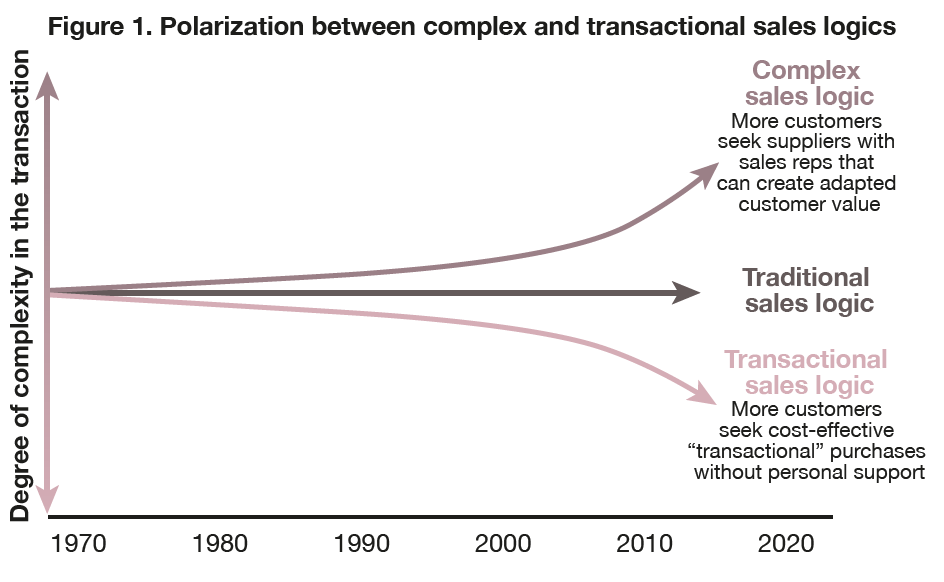
Polarization of sales logics - the future role of sales people
Not so long ago, before the Internet became a force of nature in the beginning of the 21st century, sales and marketing departments dictated the flow of information.
Customers were informed about different products and services that were marketed via traditional media channels. Traditional sales people were, in turn, in a position of power because customers were dependent on them to provide relevant information to base decisions on. Sales people had, thereby, a raison d’être as providers of information about products, guides, and sources of knowledge that was not available anywhere else. Selling was therefore relatively standardized and based on customers’ lack of choices. We can see this type of dependency historically as a traditional sales logic, where customers were prepared to pay a little bit extra for advice from a sales representative.
Along with the rise of the Internet, this sales logic became more diffuse. The value of information simply shrank when customers could access it on their own via digital channels, such as comparison sites, guidelines, do-it-yourself articles, reviews, product videos, and real-time help from their networks via social media. The market research company Forrester has demonstrated in one of its studies that 74 percent of B2B buyers perform half of their research on their own on the Internet before they contact a sales rep or make a purchasing decision.1 The same study shows that 90 percent of all purchases begin with an Internet search. Although these figures should be used cautiously – there are big differences between different types of transactions – they point to an important conclusion: the era where sales people were the first and only source of information for purchasing decisions is over. Digitalization has without a doubt changed customer behavior in the purchasing process.
Development toward increasingly informed customers correlates directly to an ever-stronger trend that has swept over all types of sales for a couple of decades: polarization of sales logics. This polarization means that the way we buy and sell has shifted from the middle to the extremes. And the gap is increasing dramatically. If customer purchases are routine, the sales rep’s role becomes less and less important and the customer can just as well perform the purchase on her own. This is a transactional sales logic, where the sales rep is partially or entirely replaced by digital marketing and sales via e-commerce platforms. The traditional sales logic is being nibbled away at the edges at an increasing pace, by automated transactional sales.
However, if the customers’ needs are complex, different or of a tailored character, the customer’s need of qualified advice increases. Here, the sales representative fills an ever-larger role and her task is shifted from being an information provider to adding value – beyond the actual offer. The sales rep becomes thereby, by definition, more of a consultant, advisor and business developer, tasked with differentiating its services by adapting and creating unique values for clients with those types of needs. This type of emerging logic is defined as a complex sales logic. The lukewarm middle segment where the traditional sales logic existed is increasingly experienced as less value-generating, uninspiring and without direction, and is thereby a dangerous path to follow. ProSales research confirms this conclusion. In one of our studies we were able to show that companies that get stuck in the middle segment (traditional sales logic) are notably less profitable than companies that lie at the extremes. On the other hand, companies that advance their position and move 20 percent of their business from traditional to transactional or complex sales logic increase their operating margins by at least 3 percentage.2 That is a considerable difference.

Polarization between transactional and complex sales logics has important implications for how today’s and tomorrow’s sales organizations should be organized. For transactional sales it is all about utilizing every technological option available to make it as easy and time-saving as possible for the customer to buy. Where customers are willing and able, and the customer’s risk is low, this is a preferable sales strategy.
The complex sales logic also requires a different sales strategy. Globalization continuously raises the bar for how complex a transaction can become. When multinational actors do business with each other, the risks and consequences can be considerable, and not only for the parties involved but for the entire global economy. Complex sales logic means that, for some transactions, clients require in-depth advice and support for complex problem solving, where tailored solutions 1 The big power shift – it’s all about the customer 17 are sought after to meet a business’ own unique needs. These transactions are often characterized by greater stakes, larger risks, more involved actors and more work. Creating customer value under this sales logic normally requires a much higher level of effort from the sales rep and her organization.
This trend also raises big questions for many sales organizations. How to choose between a transactional and a complex sales logic, with all the consequences? For many companies, the choice can result in a large and painful reorganization.3 Or try to combine the two? Few companies have succeeded in adapting their organizations to be able to handle several sales logics in parallel. But the alternative of staying in the middle will in all likelihood become more and more painful.
References:
1 https://go.forrester.com/blogs/15-05-25-myth_busting_101_insights_intothe_b2b_buyer_journey/
2 ProSales Institute (2012). Hårda fakta om säljlogiker. Stockholm: ProSales Institute Sverige AB.
3 Klingvall, M., Benzinger, Ö, Larsson-Broman, H. (2011). Jakten på Försäljningens DNA. Stockholm: ProSales Institute Sverige AB.

By Henrik Larsson-Broman
Henrik Larsson-Broman is a researcher and founder of ProSales Institute, a leading Sales Excellence research, and consultancy company. Henrik has studied trends and research in sales in the last twenty years and is author of the book “Supertrends - Facts and Insights to Future Proof your Sales and Marketing”. With extraordinary insight into the world around us, and thousands of hours of research, observations and business intelligence, he is one of the most requested speakers about what creates sales success and what it takes to build future-proof sales strategies. In the last three years, he has been awarded as one of the most popular keynote speakers in Sweden by Eventeffect.
Find out more about Henrik Larsson-Broman on LinkedIn







